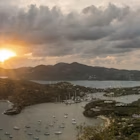
Nov 11, 2024 • 3 min read

Sequinned revellers, shiny pants, pilgrimages and historic towns – July certainly has a lot in store for the culture-conscious traveller.
Between Antigua's crazy carnival, Mongolia’s ‘manly arts’, high-diving off Bosnia Hercegovina's infamous bridge, action abounds; but a little peace and reflection can also be had as July is prime time for climbing Japan’s infamous Mount Fuji.

Ulaanbataar is the world’s coldest capital, so winter visits are not recommended. Even spring and autumn can be brisk across the Central Asian steppe. Not so July, Mongolia’s hottest month – in a variety of ways. Temperatures can hit 30°C (86°F), higher in the Gobi Desert. But it’s worth braving the heat to witness the country’s hottest spectacle: Naadam.
Held 11 to 13 July, this festival of ‘manly arts’ comprises horse-racing, archery and wrestling contests. Nomads converge on the capital, parades are held and locals play traditional games with shagai (the ankle bones of sheep). It’s a fascinating insight into Mongolian culture. Ger camps in the southern Gobi are open for business at this time. If you don’t fancy the extreme heat, focus instead on the Mongol ruins of Karakorum and cooler, northern Lake Khövsgöl, great for boating, hikes and encounters with reindeer herders.
Trip plan: Start in Ulaanbaatar. In two weeks, you could fly south to Dalanzadgad (Gobi) and travel north overland by 4WD to Lake Khövsgöl, via dunes, dinosaur fossils and ancient ruins. Fly back to Ulaanbaatar from Mörön.
Need to know: The Trans-Mongolian train between Moscow and Běijīng stops at Ulaanbaatar.
Other months: May-Oct – warm/hot (Jul-Aug: busiest); Nov-Apr – bitterly cold.

Nothing looms larger in the Japanese psyche than Mt Fuji. The perfectly conical 12,388ft (3776m) volcano is considered sacred, and even features on the ¥1000 note. As such, during official climbing season – 1 July to 14 September, when trails are snow-free and facilities open – locals flock here in droves. Yes, trekking up Fuji now will be busy, but this is as much of a cultural experience as a physical one. Part of the allure is interacting with fellow climbers, not to mention buying fizzy pop from the path-side vending machines.
Standing at the summit at dawn, watching the goraiko (arrival of the light) is moving, no matter how big the crowds. The weather is warm countrywide in July, a good time to visit another pleasingly packed site. The month-long Gion Matsuri (during which 10-tonne floats are hauled through the historic streets) sees Kyoto in full festive mode.
Trip plan: Explore Tokyo, head south to Hakone to access Fuji. Explore Kyoto, then catch the bullet train back to Tokyo.
Need to know: Public transport runs to trailheads part-way up Mt Fuji; there are four routes to the top.
Other months: Jul–mid-Sep – climbing season; Sep-Oct – fall colours; Nov-Mar – cold, snow; Mar-Apr – cherry blossom; May-Jun – warm.

Hurricane season hits the Caribbean July to November. Or so they say. In reality, this is broad brushstrokes, and the worst storms are usually saved for the later months. So head to Antigua now for – with luck – some hot, sunny, largely dry weather. The island claims 365 beaches, which might be stretching the truth... but still, there’s oodles of palm-swished loveliness to go round, as well as rum-serving beach bars.
Fit in cultural stuff too, exploring the unique Georgian-era Nelson’s Dockyard, where Admiral Nelson served for three years, and catch a game of cricket (the national sport). July also sees Antigua host its huge summer Carnival, with soca music, steel bands, high-energy parties and befeathered parades taking over the island. Order a Wadadli beer, pull on some comfy shoes and join in.
Trip plan: For a quieter stay, avoid the end of the month – the main Carnival period usually runs late July to early August. Stay a week, allowing time for snorkelling and a drive along the scenic Old Road into Antigua’s volcanic hills.
Need to know: Turtle-nesting season is June to November.
Other months: Dec-Apr – dry, cool; May-Jun – hotter; Jul-Nov – hurricane season (worst Aug-Oct).

Stari Most, the striking stone bridge over Mostar’s Neretva River, is emblematic of Bosnia Hercegovina. Originally built by the Ottomans in the 16th century, the bridge speaks of the country’s East-meets-West heritage. Destroyed in 1993, it’s a poignant reminder of the bloody Balkan conflict. Rebuilt in 2004, it’s a symbol of peace and unity. It’s also the perch from which the brave dive 69ft (21m) into the water below.
Bridge jumps happen all summer, but it’s at the end of July that thousands gather for the Ikari, the longest-running high-dive competition. It’s white-knuckle just watching. If you can’t bear to, wander the delightfully higgledy-piggledy Old Town instead. Combine Mostar with Sarajevo, where Ottoman architecture and Arabian-style bazaars merge into communist blocks still scarred by 20th-century warfare – the city was under siege for almost four years. Ponder the recent tragedy, but be uplifted by Sarajevo’s fun-loving people and hip, cheap underground bars.
Trip plan: Spend a few days in each city. Mostar to Sarajevo is a 2½-hour drive, via the formidable Neretva Canyon.
Need to know: Mostar is accessible by bus from Dubrovnik (three hours).
Other months: Jun-Sep – hot; Mar-May & Oct-Nov – quieter, cool, flowers/fall colours; Dec-Feb – snow, skiing.
Looking for more inspiration? Check out our book Where To Go When for 360 ultimate escapes from family-friendly adventures to animal encounters and relaxing retreats.
http://shop.lonelyplanet.com/world/where-to-go-when-1/


Nov 11, 2024 • 3 min read







